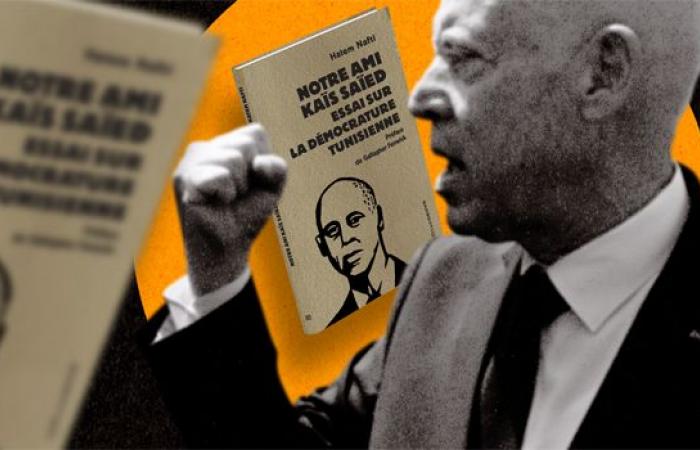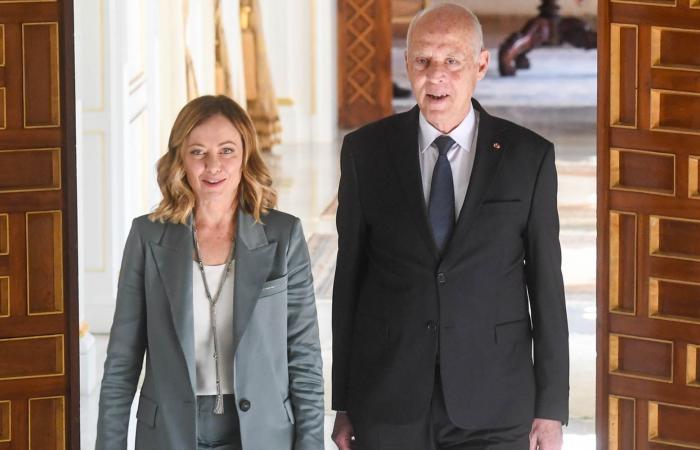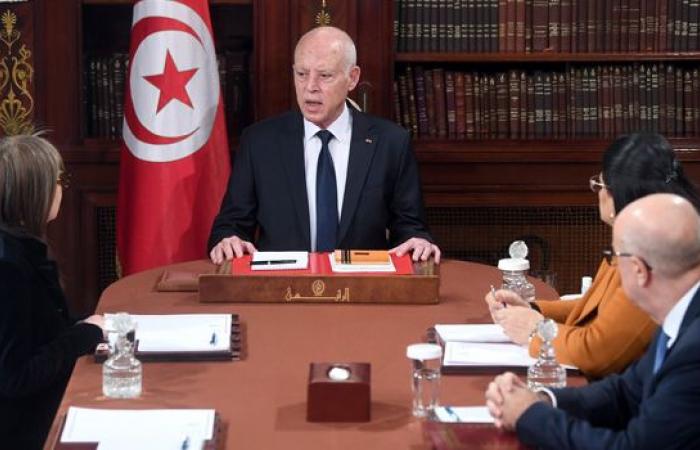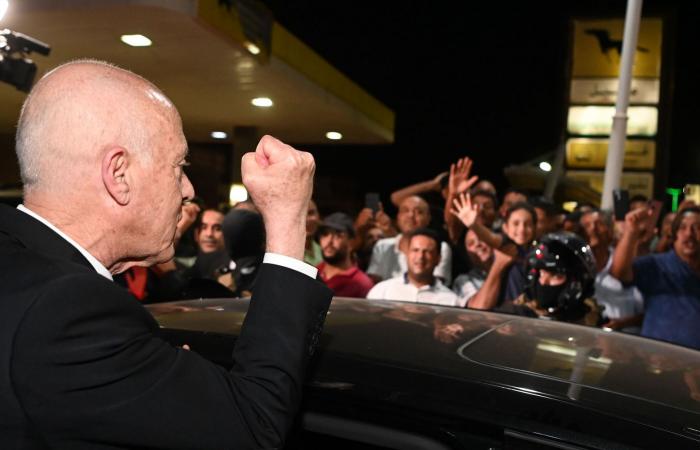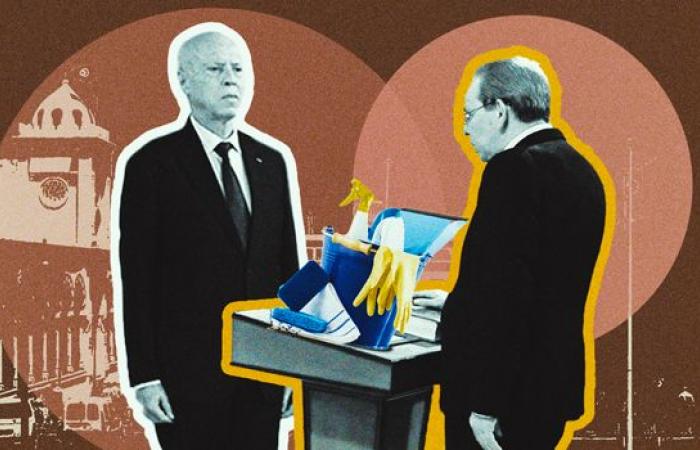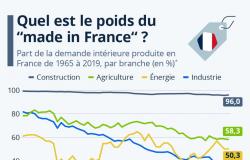“Our friend Kaïs Saïed. Essay on Tunisian democracy”, is the title of the book recently published by the essayist Hatem Nafti. A work which resembles an assessment of Kais Saied’s five-year term, both politically and socio-economically.
Why, despite the prevailing gloom, the massive emigration of Tunisians, the liberticidal excesses, was the Head of State re-elected for a second term with an overwhelming majority of votes cast? Nafti’s book provides some answers.
These are first found in the title of the essay. Are we under the rule of a dictatorship or an authoritarian regime? Legal-political definitions differ.
Hatem Nafti retains that of the Tunisian political scientist Hatem M’Rad, democracy. “Democracy is not a sincere democratic system, it can even be included in the most flexible category of authoritarianism. […] It is intrinsically pernicious and Machiavellian. It does not directly attack the democracy for which it claims to be, but it de facto denies counter-powers, the rule of law, pluralism and respect for minorities and instead accommodates itself with a government of authority, the cult of the strongman, political and social leadership at the state level, watered-down propaganda, rejection of elites and targeted repression”, writes M’Rad in his essay “Birth of a democracy”.
The title of Nafti’s essay recalls in particular the work “Our friend Ben Ali: The other side of the “Tunisian miracle”” by French journalists Jean-Pierre Tuquoi and Nicolas Beau.
“This title is not original. I wanted it above all as a nod to Emmanuel Macron’s speech at the Francophonie summit in 2022”, he specifies in an interview with Nawaat. Asked during the said summit about Kais Saied’s despotic turn, the French president expressed his support for his Tunisian counterpart. This is because the latter serves the interests of European countries, like France.
The vacuity of Saied’s anti-Western speech
The priority of European countries is the control of migratory flows. This question takes precedence over everything else. The West is ready to stand on its values in exchange for the preservation of its interests, the essayist observes. This West remained inert in the face of the repression that fell on migrants by the Saied regime. These same migrants who aspire to go to Europe.
Better still, Europe is financing this repression. In the midst of a migrant hunt in Tunisia, the President of the European Commission, Ursula von der Leyen, the President of the Italian Council Giorgia Meloni and the Dutch Prime Minister Mark Rutte traveled to Tunis, in July 2023, to sign a memorandum understanding including cooperation on the migration issue. In this context, Tunisia receives financial and logistical aid to prevent migrants from crossing the Mediterranean.
An ally of the West, Saied faces “very timid protests on his authoritarian excesses from the latter,” notes Nafti.
April 17, 2024: Giorgia Meloni meets Kais Saied in Tunis to consolidate his migration cooperation project-Presidency of the Republic.
Despite his hostile speeches against Westerners, accused in particular of supporting his opponents, and his recent visits to China and Iran, Saied has not left “the orbit of the West”, he argues.
The head of state thus has a free hand to muzzle rights and freedoms. Especially since he has just been reinforced in his position by winning 90% of the votes cast during the presidential election of October 6. Saied is dubbed by a large part of the Tunisian diaspora.
The reasons for such a plebiscite
The vote of the diaspora is aligned with that of the locals thanks, among other things, to the influence of social networks, notes Nafti.
The latter play a vital role in the dissemination of Saied propaganda. Tunisians abroad are sensitive to the anti-Western discourse advocated by Saied. “It is also a vote of revenge on their part in the face of a pro-Israeli West and in the face of the intimidation they face after October 7”, he emphasizes. And to add: “The vote of Tunisians abroad is sometimes an identity response with the Islamists of Ennahdha, sometimes Tunisian nationalist with Béji Caid Esebssi and today sovereignist and apparently anti-Western with Saied. Even third generation immigrants believe in it”.

Saied’s populism is working. Hatem Nafti adopts the theory of Dutch political scientist Cas Mudde to analyze this populism of the President of the Republic. It is “a thin ideology which considers that society is divided into two homogeneous and antagonistic camps, the pure people and the corrupt elite, and which affirms that politics should be the expression of the general will of the people”, writes Nafti.
The Head of State is making a big splash with “general concepts where everyone can project themselves”, observes the essayist. It thus remains audible both to the diaspora and to a fringe of the left and Islamists. All seduced by his populist and conspiratorial speeches.

July 29, 2024: Kais Saied visiting the Sidi Alouane delegation (Mahdia governorate). He treats himself to a walkabout – Presidency of the Republic.
As for Saied, part of the left thus finds that social questions are not a priority compared to socio-economic issues. Conservatives, for their part, are attracted by his dogmatic religious positions.
“For some, the dismantling of the old regime brandished by the President of the Republic rhymes with a break with economic liberalism. For others, it means the annihilation of societal liberalism”, rejoined Hatem Nafti.
Some progressives are also fooled by the head of state because of his hostility to Ennahdha. “However, Saied is not against Ennahdha as an Islamist movement but as a structured party which took part in power and had represented at a certain moment a certain political and even economic elite.”, underlines the essayist.
This is because Saied’s obsession is the shaking of all elites, whether economic, political or intellectual. The leader fuels class hatred in passing.
“People thus rejoice at the imprisonment of people they believed to be untouchable”, says Nafti. Other support from the Head of State is the administration as a whole, including that of the Ministry of the Interior. “Kaïs Saïed continues to repeat that the 2014 regime is destroying the State from within, an observation that he shares with the administrative elites who seek unity and order.”, writes the essayist.
The President of the Republic embodies what Nafti calls in his book “the convergence of revenge” born from a “structural despotism”. And the essayist does not hide his pessimism about the future of the country:
Saied has always behaved like an opponent looking for scapegoats. As long as the socio-economic situation remains as it is now, it will not change. Its political survival is at stake.
Hatem Nafti is himself one of these scapegoats. The essayist is regularly the subject of lynching campaigns on social networks, particularly following his interventions in the French media.

“They accuse me of being in Macron’s pay even though my anti-Macronist political position is known. I live from my work. And I am far from being the service Arabic of the Western media since I express criticism of Western policies on every occasion.”, he quips.
In order to protect players in the publishing world in Tunisia, Nafti did not opt for co-publishing his book. What he had nevertheless chosen to do for his previous works. His book is sold on order and “discreetly”, he confides. A fear that we thought had passed with the fall of the Ben Ali regime.

